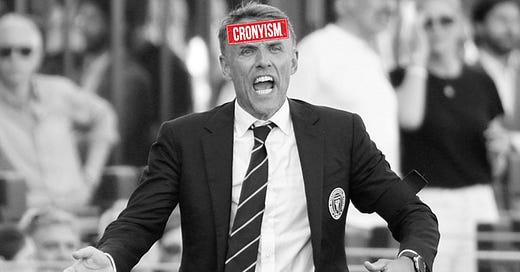Borkowski Weekly Media Trends 20-08-21
Negativity = More Likes | OnlyFans Bans Explicit Content | David Beckham's Football Club Own Goal
Want to get more likes? Post something angry
When the wizards of Silicon Valley created notifications, the pings and whistles designed to please our primitive brains, triggering reward centres with each ‘like’, few could have predicted social medias decent to the cesspit of negativity that it is today. Indeed, the vast majority of content on sites like Twitter is now negative. And according to a new study released by researchers at Yale, this is for a very simple reason: posts that express outrage get more likes.
What’s more, the study found that this is a vicious cycle. Getting more ‘likes’ on angry posts teaches people to express more negative opinions. We are now a far cry from 2010, when the Arab Spring and the so-called ‘Twitter revolutions’ were fuelling hopes, now revealed to be pipe-dreams, that social media would be a net force for good in the world. In fact, this latest study suggests that it is one of the most significant factors fuelling extremism and polarisation
The study has been interpreted by outlets such as the Telegraph to provide a scientific explanation for the decay of the centre, as ‘neutral’ opinions expressed online are seen to be less popular. The ‘learning reinforcement’ of algorithms geared toward negativity encourages us not just to express, but also, over time, to begin to hold opinions that get us the most attention online. This is because we learn to associate those outrageous opinions with the ice-cream scoops of dopamine that people liking them gives us.
The algorithms that we programmed are now programming us. This makes social media a powerful weapon in the hands of strategic adversaries of the West, who benefit from an ever-widening cultural gulf in countries like Britain and the US. Bad actors can hijack social media debates to wreak political and social division.
There is just one solution: only like dog memes.
OnlyFans bans explicit content
"Content subscription services" firm OnlyFans, which allows "fans" to pay to subscribe to a user's account to access their content, has announced it will block sexually explicit photos and videos from 1 October.
Known primarily for its adult content, especially pornography, OnlyFans has become a cult icon for a new generation of consumers who pay for content directly to models, amidst rising accusations of the mainstream pornography industry exploiting sex workers. Over the past few years, the platform has created ripples by normalising sex work and was credited with breaking down stigma around pornography in a previously unprecedented manner. The site grew exponentially over the course of the pandemic and today boasts of a staggering 130 million users.
OnlyFans' decision to axe its highest revenue source has come after pressure from banking partners. Founded in 2016 by Essex businessman Tim Stokely, the platform had found itself in trouble after a BBC News Investigation revealed that minors were using fake identification to create accounts and access pornography.
While some have hailed OnlyFans' decision as a victory against child pornography, social media has been abuzz with users claiming that this will stifle a vital source of income for several who have lost their jobs amidst the pandemic. Many have argued that this will push models towards the mainstream pornography industry, subjecting them to harsher work conditions and lower paychecks. Yet others have accused OnlyFans of "abandoning" content creators who propelled the platform to its present success.
It remains unclear as to whether OnlyFans' decision to ban adult content will have a chilling effect on the nascent content subscription industry, including on its many copycat competitors. What is certain, however, is that OnlyFans buckling under pressure from its banking partners will send a strong warning signal to upcoming companies toying with more risqué business ideas in previous no-go sectors.
David Beckham’s own goal launching Inter Miami
The launch of David Beckham’s football club has been nothing short of a disaster. In a litany of errors, which include millions of dollars’ worth of fines, a player being forced out of the team due to a breach of salary cap rules, staff investigations, and endless difficulties getting a stadium deal approved, Inter Miami are sat towards the bottom of the league with no clear path to success in sight.
Inter Miami is in trouble. However, as one source from within the club told The Athletic, “we launched a brand, not a team”. To shift the focus towards longer term goals, Inter Miami’s hierarchy appear to be ploughing on – sticking with manager Phil Neville (despite cries of cronyism) – and soldiering through the mess.
Whilst there is merit to this approach (after all, the “David Beckham’s Miami franchise” existed six years before Inter Miami graced the MLS), it does seem strange that everything they’ve done has damaged the brand within an inch of its life.
Despite the sense of schadenfreude brewing among American ‘soccer’ fans, what happens will ultimately depend on how Inter Miami’s fanbase reacts. In a previous Trends chapter, we praised Inter Miami’s clever PR campaign, which built an army of hardcore fans without playing a single game. However, with football’s growing popularity in the States (now the third most-played team sport in the country), fans will likely see straight through the Inter Miami project – marred by cronyism, inauthenticity, and negligence. Only time will tell, but the brand is in serious trouble.






